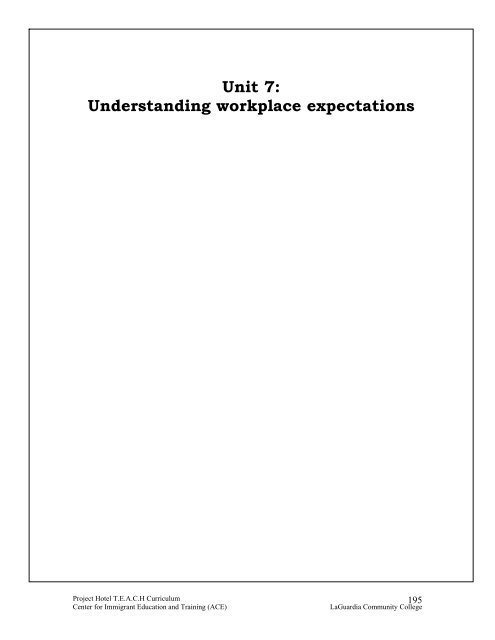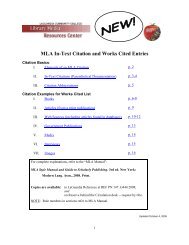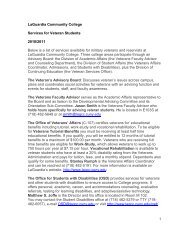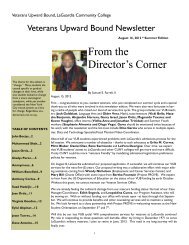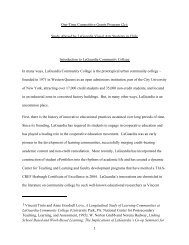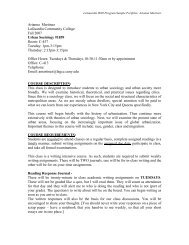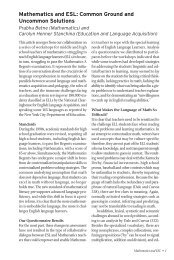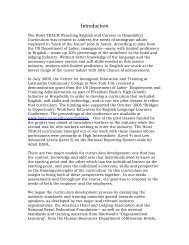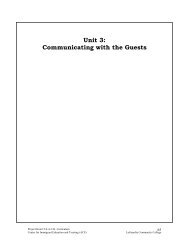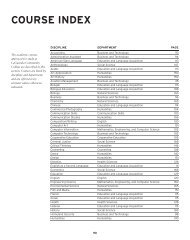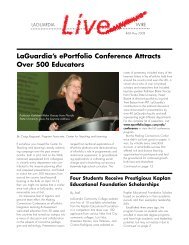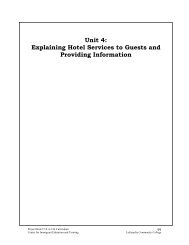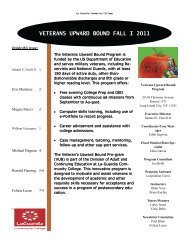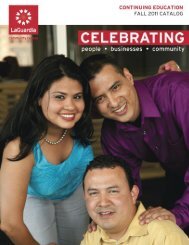Unit 7: Understanding workplace expectations - Florida Literacy ...
Unit 7: Understanding workplace expectations - Florida Literacy ...
Unit 7: Understanding workplace expectations - Florida Literacy ...
Create successful ePaper yourself
Turn your PDF publications into a flip-book with our unique Google optimized e-Paper software.
<strong>Unit</strong> 7:<br />
<strong>Understanding</strong> <strong>workplace</strong> <strong>expectations</strong><br />
Project Hotel T.E.A.C.H Curriculum<br />
Center for Immigrant Education and Training (ACE)<br />
195<br />
LaGuardia Community College
Hotel TEACH Lesson Plan<br />
<strong>Unit</strong> 7, Lesson 1A<br />
The Language for Taking Initiative<br />
Objective: Sts learn to politely make a suggestion.<br />
EFF Skill Sets<br />
Industry Skill Sets<br />
Cooperate with Others: Offer clear input<br />
on own interests and attitudes so others<br />
can understand one’s actions and<br />
reactions.<br />
Take Ownership<br />
Activity 1:<br />
In small groups, T tells Sts that they will see four photographs of<br />
employees at the Grand Idea Hotel (Handout 1). Sts select a picture card<br />
and ask each other the following questions:<br />
1) What is their job?<br />
2) What could be a problem they have with their job?<br />
3) What could be a way to fix it? (action)<br />
When Sts have finished, T asks them to talk about one of the cards.<br />
Example: In card #1 (one idea)<br />
1) They are working in the credit department<br />
2) It is difficult to move behind the counter<br />
3) Turn the desk the other way so the woman will sit on the other side of the table<br />
and it can be easier to walk around.<br />
Activity 2<br />
T then asks Sts,<br />
What would be a good way to speak to the supervisor about the idea?<br />
How could you introduce the idea?<br />
• Excuse me, would you mind if I…..<br />
• Is it ok if I ………………..<br />
• Would it be possible to…..?<br />
• Could I offer a suggestion about the….?<br />
What was the idea in this example? Turn the desk the other way<br />
What is the reason for it? It is difficult to move behind the counter<br />
What are ways to introduce a reason? Because or so<br />
Because + current situation – it is difficult to move behind the counter<br />
So + changed future situation – it will be easier to move behind the<br />
counter.<br />
Suggestion Action (verb) Reason (because or<br />
so)<br />
Is it if we turn the desk the other way because it is crowded<br />
behind the counter<br />
Would it be possible install a cordless phone so we don’t have to<br />
Project Hotel T.E.A.C.H Curriculum<br />
Center for Immigrant Education and Training (ACE)<br />
196<br />
LaGuardia Community College
to<br />
have our station in the<br />
sun?<br />
T passes out Handout 2, and in pairs Sts fill out a suggestion for each<br />
card, using “so” or “because” for their reason.<br />
When ready, Sts role-play the situations, with one person being the<br />
supervisor and the other the employee. Supervisors can either agree<br />
with the suggestion or politely refuse the suggestion and offer another<br />
idea.<br />
the<br />
Is it OK if we turn the desk the other way, because it is too crowded behind<br />
counter?<br />
That sounds good. Go ahead.<br />
Or<br />
No, we can’t do that because the computer will be too far from the outlet, but<br />
maybe we can run cables under the rug.<br />
Extension Activity<br />
Sts notice a problem at their work or at home. Sts figure out an idea to<br />
solve it and a way to suggest the idea to their supervisor, husband, wife,<br />
child, etc. In language lab, Sts record their idea. Then Sts exchange<br />
recordings and listen to see if they:<br />
1) Politely introduced the suggestion<br />
2) Suggested an action<br />
3) Offered a reason using because or so<br />
Project Hotel T.E.A.C.H Curriculum<br />
Center for Immigrant Education and Training (ACE)<br />
197<br />
LaGuardia Community College
<strong>Unit</strong> 7, Lesson 1A Handout 1<br />
Directions: Cut out and distribute four pictures to each group<br />
Card 1 Card 2<br />
Card 3 Card 4<br />
Project Hotel T.E.A.C.H Curriculum<br />
Center for Immigrant Education and Training (ACE)<br />
198<br />
LaGuardia Community College
<strong>Unit</strong> 7, Lesson 1A Handout 2<br />
Suggestion Action (verb) Reason (because or so)<br />
Is it OK if we turn the desk the other way because it is crowded<br />
behind the counter?<br />
Would it be possible to install a cordless phone so we don’t have to have<br />
our station in the sun?<br />
Project Hotel T.E.A.C.H Curriculum<br />
Center for Immigrant Education and Training (ACE)<br />
199<br />
LaGuardia Community College
Hotel TEACH Lesson Plan<br />
<strong>Unit</strong> 7, Lesson 1B<br />
Career Counseling: Taking Initiative<br />
Objective<br />
Students will learn the importance of taking initiative and identify<br />
specific examples of taking initiative at work.<br />
EFF Skill Sets addressed<br />
Industry Skill Sets addressed<br />
Plan: Set and prioritize goals.<br />
Take Responsibility for Learning: Test out<br />
new learning in real life applications.<br />
Take Ownership<br />
Exceed Customer Expectations<br />
Activity 1: Skyline Hotel<br />
T hands out the handout for the Skyline Hotel (Handout 1) and explains<br />
to Sts that they will be reading about the employees who work at the<br />
Skyline Hotel. T breaks the class up into five groups and asks them to<br />
look for examples of taking initiative. After Sts have finished reading, T<br />
asks the class these questions:<br />
What do you notice about the attitude of the staff at the Skyline Hotel?<br />
Write down individual responses on the board.<br />
T asks each group about one of the workers at the Skyline Hotel.<br />
(Group 1) What does Jorge do to show initiative?<br />
He communicates to his supervisor and informs him of the problem. He<br />
offers to fix the problem.<br />
What could have happened if Jorge had not shown initiative?<br />
Someone could have gotten hurt, and the problem could have been<br />
worse.<br />
If you were Jorge, how would you inform your supervisor about<br />
the problem and your idea to fix it?<br />
Elicit from Sts ways they would ask information from supervisor, make<br />
note of it and review preceding “Taking Initiative” language lesson if<br />
needed.<br />
(Group 2) What does Alba do to show initiative?<br />
She is working on her self-improvement by taking English classes. She<br />
is practicing English at the job and reading the English-language<br />
newspaper.<br />
What is the benefit of Alba showing initiative?<br />
Project Hotel T.E.A.C.H Curriculum<br />
Center for Immigrant Education and Training (ACE)<br />
200<br />
LaGuardia Community College
She can communicate better with her co-workers, supervisors and<br />
guests. She is improving her chances of being promoted to supervisor.<br />
(Group 3) What does Miguel do to show initiative?<br />
He calls the appropriate department to take care of the problem and<br />
takes the responsibility to fix the problem when no one from the<br />
department is available.<br />
How does the hotel benefit when Miguel shows initiative?<br />
The hotel benefits because Miguel is a team player who goes above and<br />
beyond his job description.<br />
(Group 4) How does Irina show initiative?<br />
She initiates small talk with her supervisor.<br />
Is this a good idea or not?<br />
Yes, because she shows that she is a friendly, outgoing employee.<br />
(Group 5) What does Phil do to show initiative?<br />
He thinks of his co-workers and offers to distribute the newsletter to<br />
make sure they get the information in it.<br />
What is the benefit of Phil showing initiative?<br />
All the hotel employees benefit because Phil is a team player who is<br />
looking out for the success of his fellow employees and, consequently,<br />
the hotel.<br />
T asks Sts the following and lists their responses on the board:<br />
“What are ways that you show initiative in your own life?”<br />
• Taking this class.<br />
• Fixing problems around the home.<br />
• Working on homework with your children.<br />
T asks the class:<br />
“In your own words, how would you describe what it means to take<br />
initiative?”<br />
T writes Sts’ responses on the board, along with the following definition if<br />
necessary.<br />
Initiative: A new action that you take that is intended to solve a problem<br />
or create a positive result. When you take initiative, you do so<br />
independently and without the direction of others. You do the right thing<br />
without being told, and accept responsibility above and beyond your<br />
stated job.<br />
Activity 2: The Value of Initiative<br />
T asks Sts:<br />
Is it important to take initiative at work? Why or why not?<br />
Project Hotel T.E.A.C.H Curriculum<br />
Center for Immigrant Education and Training (ACE)<br />
201<br />
LaGuardia Community College
What are some reasons why it is important to take initiative at work? (If<br />
students have trouble thinking of reasons, preface each of these<br />
suggestions with “Would you …”)<br />
You feel good about the job that you are doing.<br />
You are a valued employee.<br />
You feel confident about yourself and the work you do.<br />
You like to help others.<br />
You are a good problem solver.<br />
You understand the big picture of the job.<br />
You are a good team player.<br />
You are a good communicator.<br />
Which reason do you think is the most important for taking initiative?<br />
T reviews the EFF wheel to demonstrate Sts’ answers. T asks Sts,<br />
“Which sections of the wheel best describe taking initiative?”<br />
T then asks Sts:<br />
What are values?<br />
Values are beliefs that are important to you.<br />
Is taking initiative one of your work values? Why or why not?<br />
Is taking initiative important in your home country? Why or why not?<br />
* There may be cultural differences that discourage Sts from<br />
taking initiative. Review with Sts why taking initiative is an<br />
important value/work ethic in the <strong>Unit</strong>ed States, referring to the<br />
EFF wheel, while being sensitive to their original values.<br />
T asks Sts for examples of when they took initiative in previous jobs they<br />
held. Review with each volunteer what was good about taking initiative<br />
and what was not good about taking initiative. What were the<br />
consequences of taking initiative? Also ask students what the<br />
consequences might have been if they had not taken initiative.<br />
Activity 3: The Grandview Hotel<br />
Sts continue to work in their groups. T distributes Grandview Hotel<br />
handout (Handout 2). Sts are to read the stories of workers in the<br />
Grandview Hotel and think of ways that each worker could take initiative<br />
in his/her situation. When Sts finish this assignment, T reviews each<br />
group’s answers and puts their suggestions on the board.<br />
Project Hotel T.E.A.C.H Curriculum<br />
Center for Immigrant Education and Training (ACE)<br />
202<br />
LaGuardia Community College
Homework: Preparing to Take Initiative<br />
Sts are then asked to write in their notebooks or journals three ways in<br />
which they can take initiative at their own job. They are also to identify<br />
someone who they know takes initiative and write what it is this person<br />
does to show initiative.<br />
Teacher Tips<br />
As a follow-up, you can show the AHLA’s Ten-Minute Trainer Video:<br />
Segment 9 (“I’ve got a client coming!”) offers a good opportunity to<br />
discuss how the worker could go beyond guests’ <strong>expectations</strong> and<br />
brainstorm ways to take initiative.<br />
Project Hotel T.E.A.C.H Curriculum<br />
Center for Immigrant Education and Training (ACE)<br />
203<br />
LaGuardia Community College
Equipped for the Future<br />
The 16 EFF Content Standards<br />
The Four Categories: Communication Skills, Decision-<br />
Making Skills, Interpersonal Skills, Lifelong Learning<br />
Skills<br />
http://www.nifl.gov/nifl/eff.html<br />
Project Hotel T.E.A.C.H Curriculum<br />
Center for Immigrant Education and Training (ACE)<br />
204<br />
LaGuardia Community College
<strong>Unit</strong> 7, Lesson 1B Handout 1<br />
Skyline Hotel<br />
Welcome to the Skyline Hotel!<br />
Jorge from engineering is in the basement, working on the air<br />
conditioning. He notices that one of the lights on the stairs is out. When<br />
he has finished fixing the air conditioner, he asks his manager if he can<br />
fix the light, as he doesn’t want anyone to trip.<br />
Down the hall, Alba is on her lunch break. Alba is taking an English<br />
class at her local library. She is reading a newspaper to learn new<br />
vocabulary. She is also trying to speak only English with her co-workers.<br />
One day she would like to be a supervisor of the housekeeping<br />
department.<br />
Upstairs, Miguel is working as a doorman. No one is checking in or out;<br />
the lobby is empty and very quiet. Miguel is going to go outside and talk<br />
to his friend when he notices that one of the plants in the lobby has been<br />
knocked over and there is dirt on the floor. He phones maintenance to<br />
pick up the mess, but they are busy. He goes to the storage room and<br />
gets a broom to pick up the dirt himself.<br />
On the third floor, Irina has finished cleaning the guest rooms. She sees<br />
her supervisor in the hall and remembers that he just had his first<br />
grandchild. She says to him, “Hello, Mr. Jones! How was your weekend?<br />
Did you get to visit your grandson?” Irina and her supervisor continue to<br />
chat for the next couple of minutes.<br />
Skyline Hotel has been around for 20 years and takes pride in its staff.<br />
Management has a company newsletter that announces staff<br />
achievements and posts upcoming training opportunities. While reading<br />
the paper on his coffee break, Phil realizes that many of his co-workers<br />
don’t pick up the newsletter, so they miss important information. He<br />
decides to go to management to volunteer to distribute the newsletter to<br />
the different departments so that more people can benefit from it.<br />
Project Hotel T.E.A.C.H Curriculum<br />
Center for Immigrant Education and Training (ACE)<br />
205<br />
LaGuardia Community College
<strong>Unit</strong> 7, Lesson 1B Handout 2<br />
Grand View Hotel<br />
Welcome to the Grand View Hotel!<br />
In the basement of the hotel, Carlos is working in the laundry room and the air<br />
conditioner is broken. The laundry room is very hot, which makes it harder to work.<br />
Carlos complains to his co-workers about the heat all day, and uses it as an excuse to sit<br />
down when his supervisor isn’t looking.<br />
How could Carlos take more initiative in this situation?<br />
_________________________________________________________________________<br />
_________________________________________________________________________<br />
_________________________________________________________________________<br />
Alicia works in the lobby at the front desk, and she will be late to work because her<br />
daughter is sick. She thinks that her co-worker James always comes early, so he will be<br />
at the front desk until she gets there. She calls her supervisor and lets her know. When<br />
Alicia arrives at work, her supervisor is upset because James called in sick this day and<br />
there was no one to cover the front desk.<br />
What could Alicia have done to take more initiative in this situation?<br />
_________________________________________________________________________<br />
_________________________________________________________________________<br />
_________________________________________________________________________<br />
Down the hall, Maria is working in the banquet department. Maria has worked for the<br />
Grand View Hotel for several years, and would like to move up to manager. She knows<br />
there is a training class starting next month, but she doesn’t know how to sign up for it.<br />
She thinks, “Well, if my manager thought I was good enough, she would tell me how to<br />
sign up.”<br />
How could Maria take more initiative in this situation?<br />
_________________________________________________________________________<br />
_________________________________________________________________________<br />
_________________________________________________________________________<br />
Upstairs, Angara has almost finished cleaning the last guest room. As she is leaving the<br />
bathroom, she notices that some of the floor tiles are loose. She moves the garbage can<br />
on top of the tiles and leaves the room.<br />
How could Angara take more initiative in this situation?<br />
_________________________________________________________________________<br />
_________________________________________________________________________<br />
Project Hotel T.E.A.C.H Curriculum<br />
Center for Immigrant Education and Training (ACE)<br />
206<br />
LaGuardia Community College
Hotel TEACH: The Workplace<br />
<strong>Unit</strong> 7, Lesson 2<br />
Working with Others: Requesting Help<br />
Objective: To politely request assistance of co-workers and supervisors<br />
EFF Skill Sets<br />
Industry Skill Sets<br />
Cooperate with Others: Seek input from<br />
others in order to understand their actions<br />
and reactions.<br />
Follow Directions<br />
Activity 1<br />
T puts up four large sheets of paper on the wall, each with the following<br />
statements:<br />
1) It’s not good to ask people for help.<br />
2) It’s difficult to ask for help.<br />
3) It annoys people when others ask them for help.<br />
4) It makes people feel good when others ask them for help.<br />
T gives each St four Post-it notes, and Sts write “T” for “true” or “F” for<br />
“false” on their Post-its in response to each statement, and put it on the<br />
paper. When Sts have put down their responses, T leads class in a<br />
review of the responses. Sts get into small groups to discuss the<br />
following questions:<br />
1) What surprises you about the results from the class?<br />
2) Do people ask for help in your country?<br />
3) What are some reasons why it is good to ask for help?<br />
4) If you were a boss, would you want your employees to ask for help?<br />
Activity 2: Asking for and Accepting Help<br />
T cues up the video, AHLA “Improving Communication Skills”<br />
(#05080VHS01ENGE), to 7 minutes into the tape, where the section on<br />
active listening starts. It is a scene between a supervisor and a new<br />
engineer.<br />
Sts write down the three steps of active listening displayed on the screen:<br />
Active Listening<br />
1) Pay attention<br />
2) Understand the message<br />
3) Respond to the message<br />
T writes the following question on the board,<br />
Does the new engineer ask for help?<br />
Project Hotel T.E.A.C.H Curriculum<br />
Center for Immigrant Education and Training (ACE)<br />
207<br />
LaGuardia Community College
T asks Sts to watch the situation for the answer. T asks Sts to report<br />
back their answer:<br />
No, he doesn’t. He has a confused expression on his face when his supervisor<br />
walks into the room.<br />
T stops the tape and asks Sts:<br />
What do you think is going to happen next?<br />
T plays the tape, and then asks,<br />
What did his supervisor say? When I started fixing those air conditioners, I<br />
needed it explained a couple of times.<br />
Why did the supervisor say that?<br />
Was the engineer happy that the supervisor said that? How could you tell?<br />
What surprised you about this example?<br />
T asks Sts to think of questions the engineer could use in the future to<br />
ask for help:<br />
Do you mind showing me this again?<br />
Could you tell me how to do this again?<br />
I think I remember how to do this, but I’m not clear about this part …<br />
Finally, T asks Sts:<br />
How did the engineer show that he was listening and understood the directions?<br />
He paid attention and repeated what the supervisor said. He responded to the<br />
directions with, “It will be up and running in half an hour.” His body language<br />
showed that he was confident and that he knew what he was doing now.<br />
Activity 3 – Explaining a Task<br />
In this activity, Sts will practice explaining a task and using clarifying<br />
questions to make sure they understand, and each will teach another St<br />
the skill.<br />
Divide class into two groups (housekeeping and banquet) and have Sts<br />
sit in a circle. In housekeeping the leader is housekeeper 1 and gets<br />
Handout 1A. The rest of the housekeepers get Handout 1B. In the<br />
banquet group, the leader is banquet server 1 and gets Handout 2A. The<br />
rest of the banquet group gets Handout 2B. The leader, who “knows how<br />
to do the task,” starts the activity. (The Sts in housekeeping learn how to<br />
make the bed, and the Sts in banquet learn how to set the table.)<br />
Give the Sts time to study their handouts. The leaders need to think of<br />
how to explain the task and have the rest think of questions to ask to<br />
learn the task. Encourage Sts to use some of the questions from Activity<br />
2.<br />
For example:<br />
Could you show me how to … ?<br />
At my last job, we did it this way. Is that how I do it here?<br />
Project Hotel T.E.A.C.H Curriculum<br />
Center for Immigrant Education and Training (ACE)<br />
208<br />
LaGuardia Community College
Sts may need to ask for clarification from their classmates and practice<br />
their tag questions (<strong>Unit</strong> 2, Lesson 3B). For example:<br />
First I need to strip the bed, don’t I?<br />
The wine glasses go above the knives, don’t they?<br />
When Sts are ready, housekeeper 1 and banquet server 1 start telling<br />
their neighbor how to do the task; then that neighbor will tell the next,<br />
and so on around the circle until the last person tells housekeeper 1 or<br />
banquet server 1. (The exercise is similar to a traditional telephone<br />
activity.) The first person tells the person sitting next to him/her and so<br />
on until the last person gets the task and needs to report to either<br />
housekeeper 1 or banquet server 1. If the answers are not the same,<br />
housekeeper 1 or banquet server 1 will need to go over with the group<br />
how to do the task.<br />
Materials<br />
Four sheets of newsprint to put on wall, video from AHLA<br />
“Improving Communication Skills” (#05080VHS01ENGE) set at 7<br />
minutes into the tape.<br />
Teacher Tips<br />
The activities are from OTAN Housekeeping Curriculum and Sheraton<br />
Banquet setup instructions.<br />
Project Hotel T.E.A.C.H Curriculum<br />
Center for Immigrant Education and Training (ACE)<br />
209<br />
LaGuardia Community College
<strong>Unit</strong> 7, Lesson 2 Handout 1A<br />
Housekeeper #1 – Knows How to Make the Bed<br />
Project Hotel T.E.A.C.H Curriculum<br />
Center for Immigrant Education and Training (ACE)<br />
210<br />
LaGuardia Community College
<strong>Unit</strong> 7, Lesson 1 Handout 1B<br />
New Housekeeping Employee – Learn How to Make the Bed<br />
Directions: Ask your partner how to make the bed because your paper is not in the<br />
correct order. You will want to know what steps 1, 2, 3, etc., are. Also, take notes on<br />
what you need to do at each step.<br />
Project Hotel T.E.A.C.H Curriculum<br />
Center for Immigrant Education and Training (ACE)<br />
211<br />
LaGuardia Community College
<strong>Unit</strong> 7, Lesson 2 Handout 2A<br />
Banquet Server #1 – Knows How to Set the Table<br />
Project Hotel T.E.A.C.H Curriculum<br />
Center for Immigrant Education and Training (ACE)<br />
212<br />
LaGuardia Community College
<strong>Unit</strong> 7, Lesson 2 Handout 2B<br />
New Banquet Employee – Learn How to Set the Table<br />
Directions: Your guest, Greta Garbo, wants to sit alone, but your table is not set. Ask<br />
your partner where to put the items listed at the bottom of the page, and draw them on<br />
your table.<br />
What you need for your table:<br />
Napkin water glass wine glass salad fork dinner fork<br />
dinner<br />
knife<br />
teaspoon<br />
salt &<br />
pepper<br />
shakers<br />
bread &<br />
butter plate<br />
butter knife<br />
Project Hotel T.E.A.C.H Curriculum<br />
Center for Immigrant Education and Training (ACE)<br />
213<br />
LaGuardia Community College
Hotel TEACH Lesson Plan<br />
<strong>Unit</strong> 7, Lesson 3<br />
Career Counseling: Keeping a Professional Demeanor/Defensiveness<br />
& Criticism<br />
Objectives:<br />
Sts will learn the impact of defensive behavior and identify ways to<br />
manage feelings of defensiveness. Sts will also learn appropriate ways to<br />
give and receive criticism.<br />
EFF Skill Sets addressed<br />
Industry Skill Sets addressed<br />
Resolve Conflicts and Negotiate: Identify<br />
areas of agreement and disagreement.<br />
Listen Actively: Clarify purpose for listening<br />
and use listening strategies appropriate for that<br />
purpose.<br />
Act with Professionalism & Integrity<br />
Activity 1: Defensive Behavior<br />
T explains to the Sts that they will be watching a video clip from<br />
American Hotel and Lodging Educational Institute’s “Performance<br />
Appraisal and Coaching” (Section 14:16-15:51). This is a video that is<br />
used to instruct hotel managers on how to train their employees so they<br />
can provide improved customer service.<br />
The clip that will be shown is a scene between a manager and an<br />
employee, who are having a meeting to discuss the employee’s<br />
performance.<br />
After T shows video segment, elicit discussion with the following<br />
questions:<br />
What happened in this video?<br />
How was the employee’s response to what was being said?<br />
How was the employee’s attitude? Body language?<br />
What do you think about the employee’s behavior?<br />
As Sts respond, T writes their answers, along with the following, on the<br />
board:<br />
A defensive response is when someone is trying to protect him- or<br />
herself by making excuses for behavior.<br />
T asks Sts for examples from their lives of people being defensive.<br />
How does it make you feel when someone gets defensive?<br />
How does it feel when you become defensive?<br />
Project Hotel T.E.A.C.H Curriculum<br />
Center for Immigrant Education and Training (ACE)<br />
214<br />
LaGuardia Community College
T asks Sts:<br />
When do people get defensive?<br />
• someone disagrees with them<br />
• someone criticizes them<br />
• someone brings up a problem that they have caused<br />
• someone feels guilty or knows that he/she is wrong<br />
What usually happens when someone gets defensive?<br />
• Listening stops on both ends of the conversation.<br />
• People usually respond with defensiveness.<br />
• An argument can happen.<br />
• You don’t hear the valuable information in the criticism for<br />
you to improve your job.<br />
• You can lose trust of an employer or co-worker.<br />
T asks Sts:<br />
How can being defensive get in the way of your job?<br />
• It creates an uncomfortable work environment.<br />
• It creates tension.<br />
• You don’t hear the valuable information in the criticism for you<br />
to improve your job.<br />
• You may continue doing your job in the wrong way and put<br />
yourself at risk for losing your job.<br />
T replays the video and asks Sts to focus on the behavior of the manager.<br />
How does the manager respond to the employee’s defensive behavior?<br />
She remains calm.<br />
She allows the employee to vent.<br />
She acknowledges his feelings.<br />
She asks clarifying questions to understand his perspective.<br />
Activity 2: Criticism<br />
T elicits from Sts the good and bad aspects of criticism and writes their<br />
responses on the board in separate columns.<br />
For example:<br />
Good<br />
Bad<br />
-Can learn about your mistakes -It does not feel good to be<br />
-Can do a better job<br />
criticized<br />
-Opportunity to show improvement - Can feel embarrassed<br />
-Can be motivating<br />
- Can feel angry<br />
-Can be constructive<br />
T asks Sts the following:<br />
Project Hotel T.E.A.C.H Curriculum<br />
Center for Immigrant Education and Training (ACE)<br />
215<br />
LaGuardia Community College
Why is criticism important at the <strong>workplace</strong>? Who usually gives criticism?<br />
Sample answers: When you work with other people, you give and<br />
receive feedback. Sometimes your employers may need to point<br />
out problems with your job performance. In other situations, you<br />
may have to give criticism to co-workers and managers.<br />
T then asks Sts:<br />
What does the term “constructive criticism” mean? What is the goal of constructive<br />
criticism?<br />
Constructive criticism is criticism given in a positive way, so<br />
that the person hearing the criticism will benefit and<br />
performance will improve.<br />
T then distributes Handout 1, “Criticism Guidelines,” and reviews each<br />
point with class. Elicit from Sts what each point means to them. Ask<br />
Sts if there is anything that they would like to add on how to give<br />
constructive criticism or on how to receive criticism in a constructive<br />
way.<br />
Activity 3: Role Play<br />
Ask the class for three volunteers to perform a role play in front of the<br />
group: hotel worker 1, hotel worker 2 and hotel worker 3<br />
Distribute the role-play situation cards and instruct the class to act out<br />
the directions on the card.<br />
Hotel worker 1 and hotel worker 2 are to perform the role play first.<br />
After their role play is performed, review the experience with the class.<br />
Use the following questions to elicit discussion.<br />
Ask the St who played hotel worker 1 about the experience. How<br />
did he/she feel about the criticism? How did he/she feel like<br />
reacting? What was he/she thinking?<br />
Ask the class if anyone has been in a situation like this before?<br />
What happened? How did he/she react? Did the way he/she<br />
received criticism make a difference in his/her behavior?<br />
Then ask hotel worker 1 to perform the roleplay with hotel worker 2.<br />
Ask the St who played hotel worker 1 what was different about the<br />
experience. How did he/she feel about the criticism? How did<br />
he/she feel like reacting? What was he/she thinking? Ask the<br />
Project Hotel T.E.A.C.H Curriculum<br />
Center for Immigrant Education and Training (ACE)<br />
216<br />
LaGuardia Community College
class for any observations they have about the difference between<br />
the two role plays.<br />
Journal Exercise<br />
Give Sts the self-reflection questionnaire, and have them answer the<br />
following questions in their journals when they complete the<br />
questionnaires. What did you learn about yourself? What would you<br />
like to change about your experience of criticism? What can you do to<br />
change?<br />
Give Sts the following questions to reflect on in their journal:<br />
One of the suggestions on how to handle criticism is to take time to think<br />
about it. In your own words, what should you do in this quiet time?<br />
If someone criticizes you, whom could you confide in and tell about the<br />
criticism?<br />
Project Hotel T.E.A.C.H Curriculum<br />
Center for Immigrant Education and Training (ACE)<br />
217<br />
LaGuardia Community College
<strong>Unit</strong> 7, Lesson 3 Handout 1<br />
Guidelines for Giving Constructive Criticism<br />
• Give criticism in private.<br />
• Do not sound threatening.<br />
• Focus on the problem, not on the person’s personality.<br />
• Don’t overstate the problem by using words such as “always,” “never”<br />
or “worst.”<br />
• Don’t blame.<br />
• Don’t wait too long. Give criticism soon after the event.<br />
• Stick to one subject. Don’t string together many criticisms at one<br />
sitting.<br />
• Don’t remind people of past instances that have been resolved.<br />
• Use “I” messages. Example: “I feel overwhelmed when you don’t do<br />
the work you are responsible for because I have to do extra work.”<br />
Guidelines for Receiving Criticism<br />
• If you feel upset or angered by criticism, try not to respond<br />
immediately.<br />
• Take a deep breath and remain calm.<br />
• Don’t take it personally. You are being criticized for something you<br />
did, not for who you are.<br />
• View the criticism as an attempt to fix a problem, not a personal<br />
attack.<br />
• Maintain eye contact and open body language as you listen.<br />
• Don’t get defensive.<br />
• Use active listening.<br />
• Ask for time to think about it.<br />
• Decide what you can learn from the criticism.<br />
• Talk it over with a friend or counselor.<br />
• Figure out what you are going to say before you respond to the<br />
criticism.<br />
Project Hotel T.E.A.C.H Curriculum<br />
Center for Immigrant Education and Training (ACE)<br />
218<br />
LaGuardia Community College
Role-Play Cards<br />
<strong>Unit</strong> 7, Lesson 3 Handout 2<br />
Role play: Hotel Worker 1<br />
You are a room service attendant at the Grandview Hotel.<br />
A guest of the hotel has made a complaint to the manager about the appearance of<br />
her room. She said that the bathroom was not clean. There was hair in the tub,<br />
and she did not find any replacement soaps or shampoos. She also complained<br />
that there was trash on the floor that should have been picked up.<br />
You are the worker who was responsible for that room. Listen to what your coworker<br />
has to say about your performance. Listen to the criticism, and practice the<br />
guidelines for handling criticism.<br />
Role play: Hotel Worker 2<br />
A guest of the hotel has made a complaint about the appearance of her room. She<br />
said that the bathroom was not clean. There was hair in the tub, and she did not<br />
find any replacement soaps or shampoos. She also complained that there was<br />
trash on the floor that should have been picked up.<br />
You work with the person who was responsible for cleaning that room. This is not<br />
the first time that you have heard a complaint about this person. You are<br />
frustrated. His/her performance is slowing you down, and you feel you are doing<br />
more than your share of work. Criticize this person in a negative way.<br />
Role play: Hotel Worker 3<br />
A guest of the hotel has made a complaint about the appearance of her room. She<br />
said that the bathroom was not clean. There was hair in the tub, and she did not<br />
find any replacement soaps or shampoos. She also complained that there was<br />
trash on the floor that should have been picked up.<br />
You work with the person who was responsible for cleaning that room. This is not<br />
the first time that you have heard a complaint about this person. Give this person<br />
constructive criticism.<br />
Project Hotel T.E.A.C.H Curriculum<br />
Center for Immigrant Education and Training (ACE)<br />
219<br />
LaGuardia Community College
<strong>Unit</strong> 7, Lesson 3 Handout 3<br />
Self-Reflection Questionnaire<br />
Read the following, and give yourself a number that best describes you:<br />
(1 = Yes; 2 = No; 3 = Sometimes)<br />
When I am wrong, I am not afraid to admit it. ___<br />
I become defensive when I am being criticized. ____<br />
When I am angry and someone asks if I am, I admit it. ____<br />
People tell me I raise my voice, even though I am not aware of it. ____<br />
When I make a criticism, I make sure to refer to the person’s actions and behavior.<br />
For example, I would say, “I disagree with the way you handle our child,” rather<br />
than, “You are a bad parent.” ___<br />
Journal Exercise: What did you learn about yourself? What would you like to<br />
improve about your experience of criticism? What can you do to change? Then talk<br />
to friends and family members. What do they think of your communication skills?<br />
What are your strengths? What are your weaknesses? Would they agree with the<br />
answers you gave in your questionnaire?<br />
Project Hotel T.E.A.C.H Curriculum<br />
Center for Immigrant Education and Training (ACE)<br />
220<br />
LaGuardia Community College
Hotel TEACH Lesson Plan<br />
<strong>Unit</strong> 7, Lesson 4<br />
Exceeding Guests’ Expectations<br />
Objective<br />
To identify and practice ways of exceeding the guests’ <strong>expectations</strong><br />
EFF Skill Sets<br />
Industry Skill Sets<br />
Speak so Others Can Understand: Use<br />
multiple strategies to monitor the effectiveness<br />
of the communication.<br />
Reflect and Evaluate: Make inferences,<br />
predictions or judgments based on one’s<br />
reflections.<br />
Communicate with Others<br />
Exceed Customer Expectations<br />
Activity 1<br />
T passes out Handout 1 and asks Sts to brainstorm examples of guest<br />
services that they expect when they check in to a hotel. Sts write them<br />
on their handout.<br />
Clean room and bathroom<br />
A nicely decorated and clean lobby<br />
People around to help: front desk, bellman, etc.<br />
A restaurant in the hotel or restaurants nearby<br />
Next, T breaks class into groups and passes out Handout 2, Sheraton 11<br />
Service Basics. T asks Sts to read number 7, “Exceed Expectations,” in<br />
their groups.<br />
Exceed Expectations (going above and beyond)<br />
Provide our guests with their unexpressed wishes and desires. Strive to enhance<br />
each guest’s experience of the hotel by going beyond his/her usual requests.<br />
T encourages Sts to think about what this means and how it might<br />
change the list they originally came up with. T writes some examples on<br />
the board and has Sts think of how they might “exceed” those<br />
<strong>expectations</strong>.<br />
Guest Expectations<br />
Clean room and bathroom<br />
Restaurant in the hotel<br />
People at the front desk<br />
Exceed Guest Expectations<br />
A friendly housekeeper who can answer<br />
a guest’s questions about basic hotel<br />
information.<br />
A wait staff that knows the menu very<br />
well and can make suggestions or<br />
explain menu items.<br />
Staff does check-ins and check-outs<br />
efficiently and offers ideas for things to<br />
do in the area.<br />
Project Hotel T.E.A.C.H Curriculum<br />
Center for Immigrant Education and Training (ACE)<br />
221<br />
LaGuardia Community College
When Sts have completed their worksheets, T asks class to share ideas<br />
on how to exceed <strong>expectations</strong> as a group.<br />
Activity 2<br />
T tells Sts they are going to watch a video on Exceeding Guests’<br />
Expectations. Sts brainstorm the five key points or examples on how to<br />
approach the guest, and T writes them on the board. T plays video,<br />
Guest Relations: Aiming to Please, “Exceeding Guest Expectations”<br />
section. Sts listen and write down the five key points:<br />
1. Professional appearance<br />
2. Friendliness<br />
3. Courtesy<br />
4. Empathy<br />
5. Responsiveness<br />
In groups, Sts discuss examples of each and feed back to the class their<br />
ideas. In the second part of the video, T asks Sts to watch for the steps<br />
in “Delivering Quality Service.” After the introduction to the steps, T<br />
writes the five steps on the board. T then plays the story and stops the<br />
video and asks Sts to describe how the employee completed that step.<br />
1. “Read” the guest – The guest looked very nervous and concerned. She was<br />
talking fast on the cell phone. The employee smiled and greeted her in a<br />
polite way. He looked concerned and maintained eye contact.<br />
2. Determine the need – The employee listened to everything, asked questions<br />
and took notes (be specific). He responded to the guest’s request and passed<br />
the requests on to the manager.<br />
3. Find a solution – Manager worked with engineer and housekeeper to set up<br />
speaker phone. They spoke politely to each other.<br />
4. Deliver the service – They set up the room correctly in time for the party.<br />
5. Follow up – Employee asked how things went and made sure guest was<br />
satisfied.<br />
Activity 3<br />
In groups, Sts read the story from Handout 3 silently and, when ready,<br />
work together to answer the questions and identify the language the<br />
employee used to complete the five steps in delivering quality service.<br />
When groups are ready, Sts discuss their answers and write examples of<br />
dialogue they can use for each step on the board.<br />
Activity 4: Offers & Suggestions<br />
T breaks class into small groups designated by hotel department:<br />
housekeeping, laundry, front desk, food service. T writes the following<br />
grid on the board and passes out Handout 4 to the Sts so they can fill in<br />
more examples:<br />
Project Hotel T.E.A.C.H Curriculum<br />
Center for Immigrant Education and Training (ACE)<br />
222<br />
LaGuardia Community College
Offer or Suggestion Verb Rest of Sentence<br />
Let me show you where the elevators are.<br />
May I tell you about our desserts?<br />
Would you like me to call for a taxi?<br />
When finished, groups write examples on the board and share with the<br />
class.<br />
Activity 5<br />
When Sts are in groups of two or three, T passes out a role-play card<br />
from Handout 5 to each group. T asks Sts to role-play the situation on<br />
the card. The Sts need to organize their role play based on the five steps<br />
of delivering quality service.<br />
Sts practice their scenarios and perform for the class. T writes the steps<br />
on the board, and after the performance, T asks for examples of each<br />
step. Finally, T asks class:<br />
Was this role play an example of Sheraton Service Rule 7? Why?<br />
Extension Activities<br />
1) Journal entry: Describe what “excellent customer service” is, and<br />
talk about a time you provided excellent customer service to a<br />
guest or co-worker.<br />
2) Clear Speech Pronunciation and Listening Comprehension in North<br />
American English, Stops & Continuants, page 28: pronunciation of<br />
rhythm contractions, L & D — I will, I’ll; I would, I’d.<br />
3) Sts discuss examples of offers from Irma: Hotel Headaches on<br />
pages 2, 26 and 41.<br />
4) Practice dialogue in Make Your Mark in the Hotel Industry, <strong>Unit</strong> 2,<br />
pages 13 and 14. A bellhop takes a couple to their room and tells<br />
them about the room. Why is this good service?<br />
Homework<br />
1) During the week, Sts observe associates exceeding <strong>expectations</strong> or<br />
going above and beyond and write the observations in their journal.<br />
2) Grammar: X Word Grammar, Chapter 3, “The Relationship between X<br />
Words and Verb Forms.”<br />
Project Hotel T.E.A.C.H Curriculum<br />
Center for Immigrant Education and Training (ACE)<br />
223<br />
LaGuardia Community College
3) START Textbook, <strong>Unit</strong> 2.3. Sts read and discuss more examples on<br />
anticipating guests’ needs on page 34, “Guest Service in Action.” Sts do<br />
exercise in their workbook on page 32, “Special Guests, Special Service.”<br />
The video Guest Relations: Aiming to Please has a segment called<br />
“Handling special needs with appropriate care,” which may be used as a<br />
follow-up activity too.<br />
Materials<br />
Guest Relations: Aiming to Please, segment: Exceeding Guest<br />
Expectations, AHLA video #05221VHP03ENGE<br />
Teacher Tips<br />
The AHLA video concisely shows what is meant by “exceeding<br />
<strong>expectations</strong>.” This term may be difficult for the Sts to understand at<br />
first. They may think doing the job is the same as excellent customer<br />
service or exceeding <strong>expectations</strong>, but it’s not. Exceeding <strong>expectations</strong><br />
involves a higher level of service than just doing the job. Another video<br />
that could be used for this lesson is the Workplace Essential Skills, Video<br />
12, and the workbook Communication & Writing, page 72. The video has<br />
a segment on a waitress who is not “reading” her customers, and in the<br />
workbook the reading has a postal worker who doesn’t “read” his<br />
customer, and both get into trouble because they miss nonverbal signals.<br />
If you don’t have the AHLA video, you may substitute either of these<br />
vignettes as discussion starters for Activity 2.<br />
Project Hotel T.E.A.C.H Curriculum<br />
Center for Immigrant Education and Training (ACE)<br />
224<br />
LaGuardia Community College
<strong>Unit</strong> 7, Lesson 4: Handout 1<br />
Directions: Write down your guest <strong>expectations</strong> on the left and then an example of how<br />
the employees can make the service even better.<br />
Customer Service<br />
Guest Expectations<br />
Exceed Guest Expectations<br />
Indoor swimming pool<br />
Employee politely greets guest and directs<br />
him to the locker room and the procedure<br />
for using the locks.<br />
Project Hotel T.E.A.C.H Curriculum<br />
Center for Immigrant Education and Training (ACE)<br />
225<br />
LaGuardia Community College
<strong>Unit</strong> 7, Lesson 4: Handout 2<br />
Sheraton’s 11 Service Basics<br />
1) 10-5 Rule<br />
When you are within 10 feet of our guests, initiate eye contact with at genuine smile. When you are<br />
within 5 feet, acknowledge our guests with a warm and sincere greeting.<br />
2) Escort Our Guests<br />
Anticipate our guests’ needs by escorting them to their destination. If you are unable to do so,<br />
always ask an associate for assistance. Do not point.<br />
3) Extend Courtesy<br />
Exercise common courtesies to our guests; always allow guests to enter or exit any area first<br />
(elevators, doorways, etc.).<br />
4) One Hundred Percent<br />
Know <strong>expectations</strong> of internal and external customer (employees and guests). When a guest<br />
expresses concern, say “I apologize” or “I’m sorry.” Take ownership and follow up to ensure guest’s<br />
satisfaction.<br />
5) Our Guests Have Names<br />
Remember to use guests’ names whenever possible. Doing so makes them feel welcome and right at<br />
home.<br />
6) Telephone Courtesy<br />
A ringing phone is the first impression we make with our guests. Always use proper telephone<br />
etiquette: answer the telephone within three rings, with a smile in your voice. Use a pleasant<br />
greeting; state your name and department and say, “How may I assist you?” When necessary,<br />
always ask the guest if he/she can hold. Do not place guests on hold without their agreement.<br />
7) Exceed Expectations<br />
Provide our guests with their unexpressed wishes and desires. Strive to enhance each guest’s<br />
experience of the hotel by going beyond his/her usual requests.<br />
8) Never Say No<br />
Every guest request can be fulfilled. If you are unable to meet our guests’ <strong>expectations</strong>, be creative<br />
and always offer options. When you don’t know the answer to a question, find someone who does.<br />
9) Look Professional<br />
The image you project forms our guests’ first impressions of the hotel. Take pride in your personal<br />
appearance by maintaining an immaculate uniform (e.g, clean, unwrinkled clothes, polished shoes,<br />
neatly groomed hair and nails). The most important part of your uniform is your smile.<br />
10) Speak Professionally<br />
Always use proper vocabulary and grammar when speaking with our guests. (Use words like “yes”<br />
instead of “OK” or “yeah,” “hello” instead of “hi”, “thank you” instead of “thanks” or “uh-huh,” and<br />
“us,” “we,” “ours” instead of “they,” “them,” “theirs<br />
Have Fun!<br />
Create a pleasurable environment so that everyone leaves the hotel with a positive memory and looks<br />
forward to returning.<br />
Attitude is contagious.<br />
Project Hotel T.E.A.C.H Curriculum<br />
Center for Immigrant Education and Training (ACE)<br />
226<br />
LaGuardia Community College
<strong>Unit</strong> 7, Lesson 4: Handout 3<br />
Directions: Read the following passage. Find the answers to the following questions.<br />
When you have found the answer, give an example of the dialogue the character used.<br />
Breakfast at the Sunnyside Café<br />
Yesterday, a guest walked into the restaurant and towards the breakfast<br />
buffet. He looked a little confused. He walked away from the buffet and<br />
looked at his watch. He walked back to the buffet. He then looked<br />
around the restaurant as if he was looking for someone. The employee<br />
approached the guest and said, “Good morning. Welcome to Sunnyside<br />
Café.” The guest smiled and said, “Thank you,” and looked at the buffet.<br />
The employee said, “May I tell you about the buffet?” The guest replied,<br />
“Yes, but I’m running late, and I’m not sure if my colleague has arrived<br />
yet.” The employee answered, “Let me check the reservation list for you.<br />
What is the name?” The guest said, “Harriet Mason.” The employee<br />
replied, “Yes, she’s here. She’s at the corner table by the window. I’ll<br />
take you there. Would you like to have a coffee to start before going to<br />
the buffet?” The guest said, “Yes! That’s just what I need today!” The<br />
coffee arrived at the table in two minutes, and the guests had breakfast.<br />
As they passed, going to the exit, the employee said, “I hope you enjoyed<br />
the buffet.” The guests replied, “Oh, yes. It was perfect. Thank you.”<br />
The employee said, “Excellent. Well, have a great day. Goodbye.”<br />
--------------------------------------------------------<br />
(Complete the questions on the following page)<br />
1) How did the employee “read” the guest?<br />
Give an example of a greeting:<br />
Project Hotel T.E.A.C.H Curriculum<br />
Center for Immigrant Education and Training (ACE)<br />
227<br />
LaGuardia Community College
2) How did the employee determine the need?<br />
Give an example of a question:<br />
3) How did the employee find a solution?<br />
Give examples of an offer or suggestion:<br />
4) How did the employee deliver the service?<br />
5) How did the employee follow up?<br />
What did he say?<br />
Project Hotel T.E.A.C.H Curriculum<br />
Center for Immigrant Education and Training (ACE)<br />
228<br />
LaGuardia Community College
<strong>Unit</strong> 7, Lesson 4: Handout 3<br />
(Suggested Answers)<br />
1) How did the employee “read” the guest?<br />
He noticed that a guest had entered the restaurant and looked confused. The<br />
guest wasn’t sure where to sit, so the employee greeted him.<br />
Give an example of a greeting:<br />
Good morning. Welcome to the ------ Restaurant.<br />
2) How did the employee determine the need?<br />
He asked a question because the guest was walking to the buffet but then began<br />
walking away.<br />
Give an example of a question:<br />
May I tell you about the buffet?<br />
3) How did the employee find a solution?<br />
He listened to the guest and asked more questions, then offered to help or give a<br />
suggestion that would help the guest. The guest said he was looking for a<br />
colleague and that he was running late. The employee suggested having a coffee<br />
sent to the table for the guest to start because maybe that would make him feel<br />
calmer.<br />
Give examples of an offer or suggestion:<br />
Let me check the reservation list for you. What is the name?<br />
I’ll take you there.<br />
Would you like to have a coffee to start before going to the buffet?<br />
4) How did the employee deliver the service?<br />
He sent the coffee right to the table.<br />
5) How did the employee follow up?<br />
He asked the guests about their breakfast on their way out. The guests<br />
responded that they had had a good breakfast.<br />
What did the employee say?<br />
“I hope you enjoyed the buffet.”<br />
Project Hotel T.E.A.C.H Curriculum<br />
Center for Immigrant Education and Training (ACE)<br />
229<br />
LaGuardia Community College
<strong>Unit</strong> 7, Lesson 4: Handout 4<br />
Directions: Think about offers or suggestions you make at work or home, and fill in the<br />
chart. There are three examples done for you.<br />
Offer or Suggestion Verb Rest of Sentence<br />
Let me help you with your bag.<br />
May I open the draperies for you?<br />
Would you like me to Show you how the buffet works?<br />
Project Hotel T.E.A.C.H Curriculum<br />
Center for Immigrant Education and Training (ACE)<br />
230<br />
LaGuardia Community College
<strong>Unit</strong> 7, Lesson 4: Handout 5<br />
Role Play – Exceeding Expectations<br />
You are working at the front desk. The<br />
guest you are checking in has two<br />
children who are full of energy,<br />
running around playing.<br />
You are working at the front desk. The<br />
guest looks a little tired from his long<br />
flight.<br />
You are a server in the lobby cocktail<br />
bar. You see a guest looking at a<br />
subway map.<br />
You are working in the restaurant.<br />
You see that a guest’s coffee cup is half<br />
full.<br />
You are walking through the lobby,<br />
and you see a tired guest sitting on his<br />
suitcase.<br />
You are a housekeeper walking down<br />
the hall, and a new guest is having<br />
difficulty opening her door with her<br />
card. It looks as if she is using it<br />
backward.<br />
You are working in the restaurant, and<br />
a couple have just sat down for the<br />
breakfast buffet. They look exhausted.<br />
You are bringing up an order for room<br />
service to an elderly guest. She<br />
ordered bottled water, and you know<br />
that it is very difficult to open.<br />
Project Hotel T.E.A.C.H Curriculum<br />
Center for Immigrant Education and Training (ACE)<br />
231<br />
LaGuardia Community College
Project Hotel T.E.A.C.H Curriculum<br />
Center for Immigrant Education and Training (ACE)<br />
232<br />
LaGuardia Community College


